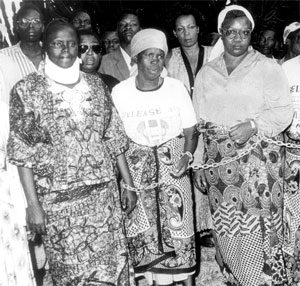By Lillian Aluanga
"To you O Lord I lift my soul.
O my God, I trust in You;
Let me not be ashamed;
Let not my enemies triumph over me.
Indeed let no one who waits on You be ashamed;
Let those be ashamed who deal treacherously without cause…"
Hope. That is what these words of the 25th Psalm spelt for a group of women united by a resolve to see their sons, who were imprisoned over their political views, released.
To drive home their point, the women camped at a corner in Uhuru Park to pray, fast, read the scriptures, and call out to anyone who cared to listen: God, the public, politicians, and the international community.
On their first night at the park, the women lit candles and held a vigil vowing not to leave the grounds until their sons were released.
Their cry was simple yet complex: "Give us back our sons." The simplicity lay in their request. But the complexity lay in the weight of the charges preferred against their sons. |
The late Prof Wangari Maathai (in neck brace) joined mothers of political prisoners to demand their release in 1992 at Uhuru Park. The women who were kicked out of Uhuru Park moved to the All Saints Cathedral where they stayed in the church’s bunker for over seven months before their sons were eventually released.[PHOTO: STANDARD] |
On Thursday, the country marked its second Mashujaa Day under the new Constitution, a day set to honour heroes and heroines who contributed to the nation’s liberation struggle.
While many women in this group may not have contributed to the struggle for Kenya’s independence, they will be remembered for their role in the country’s second liberation struggle, which sought an expansion of democratic space.
These are the mothers who fought for the release of their sons, fathers, brothers and husbands, and held together families that would otherwise have crumbled.
Leah Wanjiru Mungai, 77, Elizabeth Wanjiru Matenjwa, 74, Milka Wanjiku, 84, Veronica Wambui Nduthu, 71, and Monica Wangu Wamwere, 81, do not consider themselves heroines, but simply mothers forced to act because of their difficult circumstances.
It was their desperation to have their sons released that drove the women to bare their nakedness to police officers sent to disperse them. The news made international headlines, but closer home, implications of the act, which in many African cultures is akin to a curse, underlined to what lengths the women, with no history of political activism, would go to secure their children’s freedom. Other women like Marcella Ojuka (mother to Paddy Onyango), Margaret Opiata (mother to Odindo Opiata), Joyce Wafula (mother to Wafula Buke), Beldina Adhiambo (mother to Apiny Adhiambo), and Anne Kitur (wife to Tirop Kitur) may not have been at Uhuru Park but they, too, identified with the other womens’ struggles.
Reunited by loss
Originally, the idea, mooted by mothers of sons facing treason charges, was to march to Kamiti Prison where their sons were being held, and hold a hunger strike. But after floating the idea to several political activists, including Nobel Laureate Prof Wangari Maathai, it was decided that the women hold the protest at Uhuru Park.
As the women soldiered on, the world began to listen and the tide started to turn, culminating in the release of their loved ones, for whom life would never be the same again.
Although advanced in years, and failing in health, some of the women from the original 12 that first camped at Uhuru Park, remain alert and in tune with political events, nearly 20 years later. Not many among those who camped at the Park left without a scar. Today these scars are like badges of honour proudly worn as part of their contribution to the second liberation.
In telling their stories the women recount their struggles to hold families together, their experiences with security agents, months spent living in a bunker at the All Saints Cathedral, their views on a new Constitution, and memories of Prof Maathai who was part of the group dubbed the ‘Freedom Corner Mothers’.
In recent days these women have been reunited by the loss of the celebrated Nobel Laureate. Those interviewed eulogise Wangari as a selfless leader who stood up to the State when few dared do so.
They say time heals all wounds and majority of the women learnt how to move on with life in the face of difficulties. They learnt the art of non-violent confrontation, diplomacy and skilful negotiation, elevating them from mere spectators to participants in the push for reforms.
To these women, although an important battle was won at Freedom Corner and gains made in the country’s pursuit for reforms, the war between reformists and conformists is far from over.
Click on women for more stories on the women who helped liberate Kenya or go to: http://www.standardmedia.co.ke/women/
 The Standard Group Plc is a multi-media organization with investments in media
platforms spanning newspaper print operations, television, radio broadcasting,
digital and online services. The Standard Group is recognized as a leading
multi-media house in Kenya with a key influence in matters of national and
international interest.
The Standard Group Plc is a multi-media organization with investments in media
platforms spanning newspaper print operations, television, radio broadcasting,
digital and online services. The Standard Group is recognized as a leading
multi-media house in Kenya with a key influence in matters of national and
international interest.
 The Standard Group Plc is a multi-media organization with investments in media
platforms spanning newspaper print operations, television, radio broadcasting,
digital and online services. The Standard Group is recognized as a leading
multi-media house in Kenya with a key influence in matters of national and
international interest.
The Standard Group Plc is a multi-media organization with investments in media
platforms spanning newspaper print operations, television, radio broadcasting,
digital and online services. The Standard Group is recognized as a leading
multi-media house in Kenya with a key influence in matters of national and
international interest.










